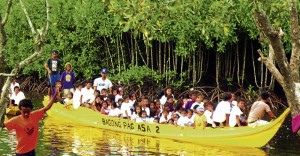Heroes come in all sizes and from all places. In October 2010, at a bloggers’ meet in Zamboanga City, communications manager Jay Jaboneta heard about children from the village of Layag Layag, who were determined to go to school.
More than 200 Muslim families, mostly fisherfolk, live in huts on stilts over the sea. Unable to buy boats, their children swam 2 kilometers and walked more than double that distance every day to go to school.
When Jaboneta put this information on Facebook, marketing expert Josiah Go urged him to set up the Zamboanga Funds for Little Kids. It raised almost $2,000 in the first week.
Anton Lim of the Buddhist Tzu Chi Foundation contacted the Zamboanga office of the Department of Environment and Natural Resources, which donated logs confiscated from illegal loggers. Boatmaker Abraham Mawadi built a boat and offered to be its caretaker, too.
When schools opened on June 6, the boat, Bagong Pag-asa, started bringing children to school.
Attendance at Talon Talon Public Elementary School soared. The students were relaxed and confident and their parents no longer worried about their kids crossing treacherous waters.
When Bicol cardiologist Dr. Ofelia Sy heard about Layag Layag, she told Jaboneta about children on the islet of Isla Mababoy in Masbate who were, literally, on the same boat.
Jaboneta called a television crew, which aired the story. Donations then poured into the Masbate Funds for Little Kids. Three classes in La Salle-St. Benilde in Manila donated their baon for one day a week to help raise funds for three boats.
More than 20 boats have since been built. The Department of Education has also built a school on the island, which now has almost 150 students.
People power
“Through sheer determination, an appetite for learning, and the desire to get themselves out of poverty, kids would swim a river and the sea just to be able to go to school every day,” Jaboneta says. “I remember Binoy from Isla Mababoy who, despite daily struggles, was the (second) top pupil in class. After we gave the yellow boats, he became (No. 1).”
“I hear of kids in Manila who skip school to go swimming,” Jaboneta says, “but these kids go swimming to go to school.” He says the kids have inspired him and other people to continue supporting them and their communities. “They are true heroes,” he says.
The Yellow Boat Project has been featured by CNN, Al-Jazeera and Associated Press.
Aside from Zamboanga and Masbate, children in many other places face the same problems.
Jaboneta, Lim and Sy have gone national; their group is now known as The Philippine Funds for Little Kids (PFLK). Go to www.facebook.com/philippine.funds.
“We call on every Filipino to start their own ‘little fund’ to help children go to school in their area,” Jaboneta says. “People power is not just about ousting leaders. It is also about taking on current challenges without waiting for authorities or celebrities to take the lead.”
How to help
PFLK needs 10 more wooden boats, valued at P7,000 each, for Isla Mababoy, and two motorized big boats, about P100,000 each, for a new site in Iloilo.
Urgently needed are de-wormers for 300 kids in Layag Layag and 150 kids on Isla Mababoy, as well as tuberculosis medicines, since more than half of Isla Mababoy’s residents are suspected to have the disease.
Coloring books, textbooks, pens, pencils, notebooks and other school supplies are welcome, as are clothes and slippers for the children.
A community and day care center is being built in Layag Layag, and a library on Isla Mababoy. Donations are accepted at https://yellowboat.tumblr.com/donate.
“I dream of seeing an Ateneo, a La Salle, a UP chapter and, in the corporate world, a Smart, a Globe chapter,” Jaboneta says.
Erda technical school
Jaboneta’s statement about city kids skipping school to go swimming reminded me of what my 13-year-old son Scott said in September.
After talking to several students of Erda Technical and Vocational School in Pandacan, Manila, Scott said, “I am amazed by their determination to finish school. They used to be street kids, scavengers or dropouts, but they are working hard to improve their lives. If only all my friends will take their studies that seriously!”
Erda was founded in 1965 by Fr. Pierre Tritz, S.J., who recently received a Senate commendation for giving up his French citizenship and dedicating his life to provide livelihood opportunities for needy Filipino children.
Now, with the help of Xavier School, Erda is changing the lives of its students. Erda head (and former Xavier principal) Jane Natividad reported that National Achievement Test scores had substantially improved (this will be discussed in a future column). Go to w4.xs.edu.ph/erda or e-mail erdafoundation@gmail.com.
Donations are always welcome. “The administrators, the teachers share their lunch with the students,” Scott says, “because the kids do not have enough to eat. Some kids hide in the library because they are embarrassed to have no money for food. Others take turns eating. Many of them have lunch only every other day.”
Scott donated the check he received for his Palanca Award this year. He also gave the royalties he got from his travel books, and will continue giving all his earnings every year.
He urges his friends to contribute (which they wholeheartedly did) and gives talks in other schools to help Erda.
He also says, “If you buy (my) book, you help those who need it the most. These students are heroes.” Scott’s books (“Top Ten Travels” in Manila, Cebu, Davao, Tokyo, Kuala Lumpur, New Zealand) are available in National Book Store.
“We are all part of the solution to our country’s problems,” Jaboneta says.
E-mail the author at blessbook@yahoo.com.
